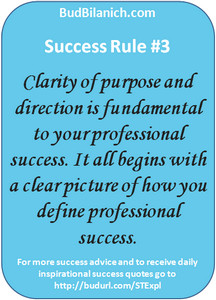 In my book 4 Secrets of High Performing Organizations, I point out that all successful, high performing organizations have four things in common: clarity of purpose and direction; the sincere commitment of all organization members; skillful execution of the things that matter; and mutually beneficial relationships with important outside constituencies.
In my book 4 Secrets of High Performing Organizations, I point out that all successful, high performing organizations have four things in common: clarity of purpose and direction; the sincere commitment of all organization members; skillful execution of the things that matter; and mutually beneficial relationships with important outside constituencies.
Clarity of purpose and direction is also fundamental to your career success. It all begins with a clear picture of how you define career success.
When I was 25, if you asked me what I wanted to be doing when I was 50, I would have told you, “Running a one person consulting, coaching and speaking business from my house.” Guess what? I have been running a one person consulting, coaching and speaking business from my house every since 1988. My clarity of purpose propelled me toward my goal.
I have a friend who is a serial entrepreneur. He started a software business when he was 27. He built it up and sold it to a major computer manufacturer by the time he was 35. He has since started and sold four other companies. His clarity of purpose lies in the challenge of creating something new, building it into a viable sustainable business and then moving on.
I have another friend who recently retired as the Executive VP of Human Resources for a Fortune 50 company. We were chatting a few days ago. She told me that when she was in college, she decided that she was going to join a good company and work her way up the ladder. She took an entry level HR job with a company she liked. It took her over 25 years, but she eventually became the most senior HR person in that company. Her clarity of purpose and definition of success was different from mine and the serial entrepreneur’s, but she reached her goal.
My second friend told me that her son has yet a different definition of success. He is not interested in climbing the corporate ladder, or in being an entrepreneur. He wants an interesting job where he can contribute, but he doesn’t want to spend inordinate amounts of time at work. He wants to spend as much time with his family as he can. His definition of success is different from his mother.
All four of us are career successes – according to our clarity of purpose.
There is no one correct definition of career success. There are as many definitions as there are people in this world. Your definition of career success is what’s right for you – not anyone else. I would not have been happy building and selling a number of businesses in succession, climbing a corporate ladder or working for a large company in an individual contributor position. However, as you can tell from the stories of the three people above, they were. They knew what they wanted and they went after it.
That’s why defining your clarity of purpose is so important. Your clarity of purpose provides both a foundation and launching pad for your career success. The old saying, “If you don’t know where you’re going, you won’t know when you get there” is a cliché but true. Getting clear on your personal definition of profession success is the first step to becoming a career success.
If you haven’t already done so, I suggest you take some time and think about your clarity of purpose? How do you define career success for yourself? Keep that purpose and definition of success in mind as you read the other rules in this book. Think about how these rules can help you reach your purpose.

Speak Your Mind